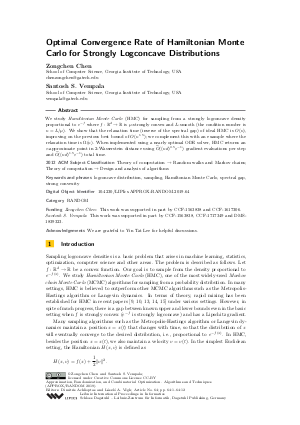@InProceedings{chen_et_al:LIPIcs.APPROX-RANDOM.2019.64,
author = {Chen, Zongchen and Vempala, Santosh S.},
title = {{Optimal Convergence Rate of Hamiltonian Monte Carlo for Strongly Logconcave Distributions}},
booktitle = {Approximation, Randomization, and Combinatorial Optimization. Algorithms and Techniques (APPROX/RANDOM 2019)},
pages = {64:1--64:12},
series = {Leibniz International Proceedings in Informatics (LIPIcs)},
ISBN = {978-3-95977-125-2},
ISSN = {1868-8969},
year = {2019},
volume = {145},
editor = {Achlioptas, Dimitris and V\'{e}gh, L\'{a}szl\'{o} A.},
publisher = {Schloss Dagstuhl -- Leibniz-Zentrum f{\"u}r Informatik},
address = {Dagstuhl, Germany},
URL = {https://drops.dagstuhl.de/entities/document/10.4230/LIPIcs.APPROX-RANDOM.2019.64},
URN = {urn:nbn:de:0030-drops-112790},
doi = {10.4230/LIPIcs.APPROX-RANDOM.2019.64},
annote = {Keywords: logconcave distribution, sampling, Hamiltonian Monte Carlo, spectral gap, strong convexity}
}

 Creative Commons Attribution 3.0 Unported license
Creative Commons Attribution 3.0 Unported license















